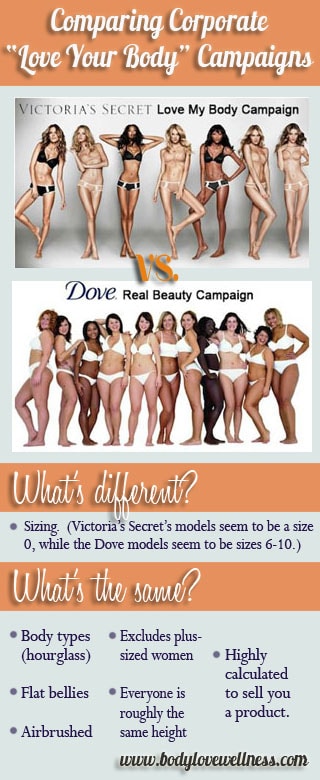 I often ask myself if I’m wrong to talk about beauty as much as I do.
I often ask myself if I’m wrong to talk about beauty as much as I do.
I know that the question of beauty is a contentious one. If beauty is used to make women feel like they don’t measure up, then maybe the whole idea of beauty should be tossed out the window.
The argument isn’t a bad one. Many feminist writers, whom I respect very much, would say that beauty is a bad ideal. Beauty is used to keep women down and keep us competitive with one another. And for this and other reasons, we should no longer focus on beauty or wanting to be beautiful.
Is Wanting To Be Beautiful Bad For Your Self Esteem?
You may have seen this recent piece by Jessica Valenti in The Nation. In it, she contends that by promoting self-esteem in young women, we’re really telling them that they should do whatever it takes to feel good about themselves, including adhering to a beauty myth which will have them buying plastic surgery as soon as they can. She writes:
“Young women know exactly how ugly the culture believes them to be. So when we teach girls to simply “love themselves”, we’re implicitly telling them to accept the world as it is. We’re saying that being beautiful is something worth having when we should be telling them a culture that demands as much is toxic.”
I agree with Jessica Valenti’s assertion that raising women and girls’ self esteem and belief in their own beauty without a contextual discussion of our messed up society is a bad idea, but I also don’t see this discussion being left out by anyone actually doing this work.
There’s a difference between the coaches, counselors and organizations that actually work to promote self-esteem and the corporate interests who have conflated self esteem and beauty as a way to sell products. Gussying up the beauty myth under the guise of promoting self-esteem is just the latest marketing trick. It’s like when the diet companies realized in the early 1990’s that they would sell more diets by marketing their plans as healthy. Diets didn’t become any more healthy, but they became more popular again, and weight and health continued to be muddled.
In other words, promoting self esteem isn’t dangerous, we just can’t get our ideas about self esteem from the same place that we buy our body lotion. (I’m looking at you, Dove.)
Blowing Up The Beauty Myth
So is beauty an old, tattered concept that we should collectively throw away? Is it time to throw the beautiful baby out with the patriarchal bathwater, so to speak?
Personally, I don’t think we should. I just think we need to rethink our conception of beauty.
To me, beauty isn’t something that we should strive to attain. Beauty isn’t some scarce thing that only a select few get to have. Beauty is big and bold. Beauty is quiet and delicate. Beauty is everywhere.
Somewhere along the line the definition of beauty became about looking like society’s ideal of beauty. Beauty became about perfection. Maybe we should blame the ancient Greeks (I’m looking at you, Plato) or ladymags (I’m simultaneously looking at you, Cosmo).
But perfection is only one kind of beauty, and it’s probably the least interesting.
Even if we’re just talking about physical beauty, who among us hasn’t found beauty in crinkly eye wrinkles, crooked smiles, messy hair, dimply fat, etc? Why do you assume that your ability to see unique beauty in others won’t apply when others see you?
Beauty shouldn’t be about changing yourself to achieve an ideal or be more socially acceptable. Real beauty, the interesting, truly pleasing kind, is about honoring the beauty within you and without you. It’s about knowing that someone else’s definition of pretty has no hold over you. When you know that, your self esteem does improve, no surgery or botox or cosmetics required.
For tips on feeling beautiful and improving self esteem, check out my Body Love 101 resource page.
Golda is a certified holistic health counselor and founder of Body Love Wellness, a program designed for plus-sized women who are fed up with dieting and want support to stop obsessing about food and weight. To learn more about Golda and her work, click here.
(Listen to this post here, or subscribe on itunes.)

“Perfection is only one kind of beauty, & it’s probably the least interesting.” -@bodylovewellnes http://t.co/vMzIGjrV
Golda you are awesome. Why is it so difficult for people to love and respect each other and this beautiful planet?
I think this is a huge issue at any age. From a clinical perspective, the incidence of eating disorders has increased proportionately in women over the age of 30. I have watched my mother go through lap band surgery, face lift, injections,etc. and at the age of 70, still has the same unhealthy behaviors when it comes to her body, beauty, sexuality,etc. This pursuit of perfection has been perpetuated in the beauty industry since her youth and this standard of beauty constantly reinforced through our media.
I saw someone post this on a blog a few weeks ago and I think its great (yes a dove ad). I wish it had actually run on a large national scale and not just hidden on a website campaign. It speaks volumes:
So much of what constitutes our ideas of beauty is an exclusion process. A friend posted that same photo you posted, and remarks came in…. “What if you’re skinny?”. Fine. Be skinny! Skinny can be an option, but should not be a requirement, any more than a certain lip size, a certain hair texture, or certain skin color should define beauty.
Great post Golda. I’ve been struggling recently with being “allowed” to still like fashion/clothes/makeup and feeling beautiful, and be a feminist raising my daughters to be strong empowered women….
“Perfection is only one kind of beauty, & it’s probably the least interesting.” -@bodylovewellnes http://t.co/mEjtjuqS
I agree that the problem is not with the idea of beauty, but of defining beauty narrowly and exclusively.
I think that’s why, when you and I were working together, I had trouble with the affirmation “my thighs are beautiful”, but was just fine with “my thighs are perfect”.
The word “beautiful” automatically made me refer to the beauty standard. My thighs didn’t look like “beautiful women’s” thighs, so they could not be “beautiful”.
But for me, the word “perfect” didn’t have an outside meaning. “Perfect” was whatever I wanted it to mean. So I could see my thighs as “perfect” and not feel that dissonance.
It wasn’t about whether I liked my thighs, or even whether I found them aesthetically pleasing. So it wasn’t the concept of beauty, but the specific standard the word evokes for me.
I got what I needed from “perfect” but maybe my next step is to start building new associations for “beautiful”. :)
Well, true beauty is really in the eyes of the beholder.
http://t.co/5Bk0UMzm
This is really well said. Dangerous Beauty? — Body Love Wellness http://t.co/UsNBQhIR